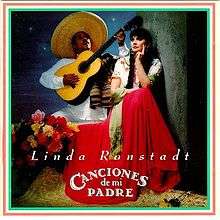Canciones de Mi Padre
| Canciones De Mi Padre | ||||
|---|---|---|---|---|
 | ||||
| Studio album by Linda Ronstadt | ||||
| Released | November 24, 1987 | |||
| Recorded | 1987 | |||
| Genre | Mariachi, Ranchera, Latin, Mexican | |||
| Length | 42:57 | |||
| Label | Elektra/Asylum Records, Rhino | |||
| Producer | Peter Asher | |||
| Linda Ronstadt chronology | ||||
| ||||
| Professional ratings | |
|---|---|
| Review scores | |
| Source | Rating |
| Allmusic | |
| Rolling Stone | |
Canciones De Mi Padre (Spanish for "Songs of My Father", or "My Father's Songs") is American singer/songwriter/producer Linda Ronstadt's first album of Mexican traditional Mariachi music.
History
The album was released in late 1987 and immediately became a global smash hit. At 2½ million US sales, it stands as the biggest selling non-English language album in American record history. This album has been RIAA certified Double-Platinum (for over 2 million US copies sold) and also won Ronstadt the Grammy Award for Best Mexican/Mexican-American Album at the 31st Grammy Awards.
These canciones were a big part of Ronstadt's family tradition and musical roots. The title Canciones De Mi Padre refers to a booklet that the University of Arizona published in 1946 for Ronstadt's deceased aunt, Luisa Espinel, who had been an international singer in the 1920s.[3] The songs come from Sonora and Ronstadt included her favorites on the album. Also, Ronstadt has credited the late Mexican singer Lola Beltrán as an influence in her own singing style, and she recalls how a frequent guest to the Ronstadt home, Eduardo "Lalo" Guerrero, father of Chicano music, would often serenade her as child with these songs.[4]
In the accompanying printed material, each song's Spanish lyrics were paired with an English translation and a discussion of the song's background or its significance for Ronstadt (omitted on the CD). Rubén Fuentes served as musical director/bandleader. Follow-up albums include Mas Canciones, Frenesí, and the Rhino Records compilation Mi Jardin Azul: Las Canciones Favoritas, which collects songs from the previous three Spanish-language albums. Las |Canciones de mi Padre, also is the only recording production in the world that used the 3 best Mariachi bands in the world: Mariachi Vargas,Mariachi Los Camperos and Mariachi Sol de Mexico. As of 2012, Canciones de Mi Padre had sold nearly 10 million copies worldwide.
Track listing
| No. | Title | Writer(s) | Length |
|---|---|---|---|
| 1. | "Por Un Amor" (For a Love) | Gilberto Parra | 2:56 |
| 2. | "Los Laureles" (The Laurels) | José López | 2:25 |
| 3. | "Hay Unos Ojos" (There Are Some Eyes) | Rubén Fuentes | 2:45 |
| 4. | "La Cigarra" (The Cicada) | Ray Pérez y Soto | 3:45 |
| 5. | "Tú Sólo Tú" (You, Only You) | Felipe Valdez Leal | 3:09 |
| 6. | "Y Ándale" (Get on with It) | Minerva Elizondo | 2:32 |
| 7. | "Rogaciano El Huapanguero" (Rogatian The Huapanguero) | Valeriano Trejo | 3:00 |
| 8. | "La Charreada" (The Charreada) | Felipe Bermejo | 3:49 |
| 9. | "Dos Arbolitos" (Two Little Trees) | Chucho Martínez Gil | 2:34 |
| 10. | "Corrido De Cananea" (Ballad of Cananea) | Rubén Fuentes | 3:24 |
| 11. | "La Barca De Guaymas" (The Boat from Guaymas) | Rubén Fuentes | 3:25 |
| 12. | "La Calandria" (The Lark) | Nicandro Castillo | 3:00 |
| 13. | "El Sol Que Tú Eres" (Sun That You Are) | Daniel Valdez | 2:57 |
Personnel
- Linda Ronstadt – vocals
- Michael J. Ronstadt – vocals
- Danny Valdez – vocals, guitar
- Gilberto Puente – guitar
- Jorge Lopez – guitar
- Samuel Gutierrez– guitar
- Felipe Perez – violin
- Antonio Ramos – violin
- Salvador Torres – violin
- Steve Fowler – flute
- Ron Kalina – harmonica
- Juan Gudiño - Trumpet
- Ignacio N Gomez – Trumpet
- Jim Self – tuba
- Larry Bunker – percussion
- Pedro Rey - Vocals w/Linda Ronstadt
- Pedro Rey Jr. - Vocals
Production
- Peter Asher - Producer
- Ruben Fuentes - Producer
- Edd Kolakowski - Assistant producer
- Shawn Murphy - Recording and Mixing Engineer
- Sharon Rice - Assistant engineer
- Dwayne Seykora - Assistant engineer
- Doug Sax - Mastering engineer
- John Kosh - Design and art direction
- Bob Blakeman - Photography
- Gilbert Ronstadt - Back cover painting
- J.Roy Helland - Make-up and hair
- Manuel - Wardrobe design
- Janet Stark - Assistant to Miss Ronstadt
See also
References
- ↑ Erlewine, Stephen Thomas. Canciones de Mi Padre at AllMusic. Retrieved 2011-06-29.
- ↑ Rolling Stone review
- ↑ "Tucson'sRonstadtFamily". The Arizona Library. Retrieved May 30, 2007.
- ↑ "AARP Segunda Juventud Online". Linda Ronstadt, The music legend opens up to AARP Segunda Juventud Online,By Anita Mabante Leach, August 2007. Archived from the original on August 28, 2008. Retrieved September 16, 2007.
- ↑ Linda Ronstadt Album and CD Releases 1983 - 1990. Retrieved 2012-07-11.